
AMERICAN JOURNAL OF DERMATOPATHOLOGY
Scope & Guideline
Exploring Innovations in Dermatopathology
Introduction
Aims and Scopes
- Histopathological Analysis of Skin Diseases:
The journal consistently publishes articles that provide detailed histopathological insights into various skin disorders, including neoplasms, inflammatory conditions, and infectious diseases, thereby enhancing understanding and diagnosis. - Clinical Case Reports and Challenges:
A significant portion of the journal's content is dedicated to clinical case reports that present unique or challenging cases in dermatopathology, fostering knowledge sharing and discussion among professionals. - Immunohistochemistry and Molecular Pathology:
Research focusing on the application of immunohistochemical techniques and molecular pathology in diagnosing skin conditions is a core area, highlighting advancements in diagnostic accuracy and treatment approaches. - Emerging Dermatopathological Entities:
The journal addresses new and rare dermatopathological entities, documenting their clinical presentations, histological features, and implications for diagnosis and management, contributing to the evolving landscape of dermatopathology. - Therapeutic and Prognostic Implications:
Research articles often discuss the therapeutic implications of histopathological findings and their prognostic significance in skin cancer and other dermatological conditions, aiding clinicians in treatment planning.
Trending and Emerging
- Integration of Artificial Intelligence in Diagnostics:
Recent publications increasingly focus on the application of artificial intelligence and machine learning techniques in dermatopathology, enhancing diagnostic accuracy and efficiency. - Molecular Pathology and Genomic Studies:
There is a rising trend in studies exploring the molecular and genomic underpinnings of skin diseases, including the use of next-generation sequencing and genetic profiling, which provide insights into disease mechanisms and potential therapeutic targets. - Cutaneous Manifestations of Systemic Conditions:
An emerging area of focus involves the exploration of cutaneous manifestations associated with systemic diseases, highlighting the interconnectedness of dermatology and other medical disciplines. - Innovative Therapeutic Approaches:
The journal has seen an increase in articles discussing novel therapeutic strategies, particularly in the context of immunotherapy and targeted treatments for skin cancers, reflecting advancements in patient management. - Environmental and Infectious Impacts on Dermatology:
There is a growing interest in examining how environmental factors and infectious agents influence dermatopathological conditions, especially in light of recent global health challenges.
Declining or Waning
- Traditional Histopathological Techniques:
There appears to be a gradual decline in publications centered around traditional histopathological techniques without the integration of modern molecular or immunohistochemical methods, reflecting a shift towards more advanced diagnostic approaches. - Rare Infectious Dermatoses:
The frequency of articles focusing specifically on rare infectious skin diseases has diminished, possibly due to the increasing focus on more prevalent or novel dermatopathological conditions. - Historical Perspectives in Dermatopathology:
There has been a noticeable decrease in articles that provide historical reviews or perspectives on dermatopathology, indicating a shift towards contemporary research and emerging findings. - Overlapping Conditions in Dermatopathology:
The exploration of overlapping conditions or differential diagnoses in dermatopathology has become less frequent, suggesting a narrowing of focus towards more distinct entities and clear-cut diagnoses. - General Dermatological Reviews:
General reviews of dermatological conditions that do not delve deeply into histopathological aspects or specific diagnostic challenges have seen a decline, as the journal emphasizes more specialized content.
Similar Journals
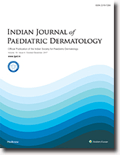
Indian Journal of Paediatric Dermatology
Innovating care for young skin.Indian Journal of Paediatric Dermatology (ISSN: 2319-7250; E-ISSN: 2319-7269), published by Wolters Kluwer Medknow Publications, stands as a pivotal resource in the specialized field of paediatric dermatology. As a peer-reviewed open access journal since 2013, it aims to disseminate cutting-edge research, clinical practices, and innovative developments that cater to the specific dermatological needs of children. The journal provides an essential forum for collaboration among researchers, clinicians, and students, facilitating the sharing of knowledge on a wide array of topics, including skin conditions unique to paediatric populations, treatment methodologies, and advancements in dermatological care. With a commitment to enhancing the understanding and treatment of paediatric skin diseases, this journal plays a critical role in shaping best practices and informing future research directions in a rapidly evolving field.
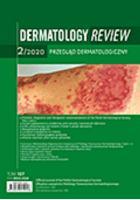
Przeglad Dermatologiczny
Enhancing Understanding of Skin Conditions WorldwidePrzeglad Dermatologiczny is a peer-reviewed open-access journal published by TERMEDIA PUBLISHING HOUSE LTD, based in Poland. Since its establishment in 1951, this journal has been dedicated to advancing the field of dermatology by providing a platform for the dissemination of original research, reviews, and clinical case studies. With an e-ISSN of 2084-9893, it has gained recognition within the academic community, despite its current classification in the Q4 quartile of dermatological journals. The journal has been openly accessible since 2009, promoting wider dissemination of scientific knowledge, and is crucial for researchers, professionals, and students alike. While it holds a current rank of #105 out of 142 in the Scopus Dermatology category, the journal continually strives to enhance its impact through quality publications that address pressing dermatological issues. The diverse range of topics covered in the journal ensures it remains a vital resource for those looking to stay informed on the latest developments in dermatological research.

International Journal of Clinical and Experimental Pathology
Bridging Clinical Insights with Experimental FindingsInternational Journal of Clinical and Experimental Pathology, published by E-CENTURY PUBLISHING CORP, serves as a vital resource for professionals in the field of pathology. With its ISSN 1936-2625, the journal has positioned itself within the competitive landscape of medical journals, achieving commendable rankings in Scopus, particularly in the categories of Pathology and Forensic Medicine (Rank #98/185) and Histology (Rank #38/58). Although its coverage in Scopus has been discontinued, the journal’s past contributions from 2009 to 2017 continue to be a touchstone for researchers interested in advancing their understanding of clinical and experimental pathology. The open-access format ensures accessibility to a wide audience, fostering collaboration and education in this essential medical discipline. By bridging clinical research and experimental findings, this journal plays a crucial role in disseminating knowledge and enhancing practices within pathology, making it an indispensable tool for researchers, professionals, and students alike.
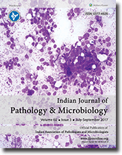
Indian Journal of Pathology and Microbiology
Unlocking Insights in Medical Pathology and MicrobiologyIndian Journal of Pathology and Microbiology, published by Wolters Kluwer Medknow Publications, is a distinguished open-access journal that has been fostering knowledge dissemination in the fields of pathology and microbiology since 2008. With an ISSN of 0377-4929 and E-ISSN 0974-5130, this journal serves as a critical resource for researchers and practitioners committed to advancing their understanding of medical sciences in India and beyond. Spanning decades of valuable research contributions since its establishment in 1972, it provides a platform for peer-reviewed articles that explore current trends and innovations in medicinal pathology and microbiological studies. Although it holds a Q4 ranking in categories such as medicine and microbiology, it maintains a notable Q3 classification in pathology and forensic medicine, highlighting its relevance to contemporary scientific discussions. Accessible freely to a global audience, the journal plays a pivotal role in enhancing scholarly communication and collaboration, making it an indispensable tool for students, professionals, and researchers alike aiming to contribute to this evolving discipline.

ARCHIVES OF DERMATOLOGICAL RESEARCH
Exploring Breakthroughs in Dermatological ScienceArchives of Dermatological Research is a premier journal dedicated to the rapidly evolving field of dermatology, published by Springer. With a distinguished history dating back to 1971 and indexed in the top quartiles (Q1 in Dermatology and Q2 in Medicine, 2023), this journal serves as a vital resource for researchers, clinicians, and students alike. It publishes innovative findings, critical reviews, and comprehensive studies that advance our understanding of dermatological conditions and treatments. The journal's commitment to disseminating high-quality research in a field crucial to public health emphasizes the importance of advancing knowledge in skin science and therapy. For those looking to explore significant advancements in dermatology, Archives of Dermatological Research offers an invaluable platform for scholarly discourse and knowledge exchange, though it is not an Open Access journal. Based in Germany, this publication attracts a global audience and remains at the forefront of dermatological research until its anticipated converged years reaching 2024.
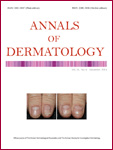
Annals of Dermatology
Exploring breakthroughs in dermatological research.Annals of Dermatology is a prestigious academic journal published by the Korean Dermatological Association, focusing on the latest research and advancements in the field of dermatology. With a commitment to advancing knowledge in skin health and disease, this journal serves as a vital resource for researchers, clinicians, and students working in dermatology and related disciplines. Since its inception in 1989, it has evolved to consolidate its position in the academic community, boasting a Q2 ranking in the 2023 Dermatology category and a Scopus rank of #87 out of 142, placing it in the 39th percentile. Although it operates under a subscription model, the journal's impact factor reflects its significance in advancing dermatological research, attracting innovative studies and reviews that shape clinical practice. With a publication history extending from 1989 to 1996 and then from 2008 to the present, Annals of Dermatology continues to be an essential publication for those devoted to improving skin health.
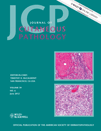
JOURNAL OF CUTANEOUS PATHOLOGY
Elevating Knowledge in Histology and DermatopathologyJOURNAL OF CUTANEOUS PATHOLOGY, published by WILEY, serves as a vital resource in the fields of dermatology, pathology, and histology, reflecting its distinguished position with impressive categorization quartiles: Q2 in Dermatology and Pathology and Forensic Medicine, and Q3 in Histology for 2023. Established in 1974, this esteemed journal features peer-reviewed research that drives advancements in understanding skin diseases, with a convergence period extending to 2024. The journal's impactful contributions are evident through its Scopus rankings, placing it among the top tiers of its category, specifically holding the 52nd rank in Dermatology. Researchers, professionals, and students will find the journal invaluable for its rich content and critical insights into cutaneous pathology, despite its current non-open access status. The journal's dedication to fostering knowledge in this specialized field underlines its significance as a go-to reference for ongoing scholarship and clinical practice.
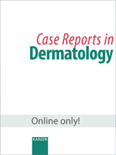
Case Reports in Dermatology
Pioneering the future of dermatology with every case report.Case Reports in Dermatology is a leading Open Access academic journal dedicated to the publication of case reports and unique clinical findings in the field of dermatology. Published by KARGER and based in Switzerland, the journal has been an open access resource since 2009, enhancing the visibility and accessibility of vital research for dermatology professionals and the scientific community. With an impressive ISSN of 1662-6567 and ranking in the Q3 category among dermatological journals, it serves as a crucial platform for researchers seeking to share innovative case studies, validate diagnostic approaches, and explore treatment outcomes. The journal continues to contribute to advancing dermatological science with a convergence timeline extending from 2010 to 2024. By promoting the dissemination of emerging knowledge and practices, Case Reports in Dermatology plays a significant role in fostering collaboration among practitioners, enhancing educational efforts, and ultimately improving patient care in dermatology.
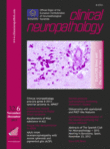
CLINICAL NEUROPATHOLOGY
Empowering clinical practice through innovative neuropathology research.CLINICAL NEUROPATHOLOGY is a vital scholarly journal published by DUSTRI-VERLAG DR KARL FEISTLE, specializing in the domains of neurology, pathology, and their clinical applications. Established in 1982 and spanning through to its projected completion in 2024, this journal disseminates high-quality research that significantly contributes to the understanding of neurological disorders and their pathological underpinnings. While the journal currently operates under a traditional access model, its commitment to rigorous peer review ensures the publication of impactful findings, strengthening its foothold in the field, as evidenced by its Q3 quartile rankings in several categories, including Medicine (miscellaneous), Neurology, and Pathology and Forensic Medicine. Those engaged in clinical research and practice will find CLINICAL NEUROPATHOLOGY to be an essential resource for the latest advancements, trends, and discussions that shape the future of neurological pathology.

Journal of Dermatology & Dermatologic Surgery-JDDS
Empowering Dermatology Through Collaborative ResearchJournal of Dermatology & Dermatologic Surgery (JDDS) is a premier open access journal published by Wolters Kluwer Medknow Publications since 2018. This journal serves as a vital platform for the dissemination of cutting-edge research and advancements in the field of dermatology and dermatologic surgery. With its ISSN 2352-2410 and E-ISSN 2352-2429, JDDS strives to present high-quality articles that encompass clinical studies, innovative surgical techniques, and comprehensive reviews, thereby catering to the interests of researchers, medical professionals, and students alike. The journal has gained recognition within the academic community, evidenced by its Scopus ranks, placing it 237th out of 551 in the Medicine - Surgery category and 70th out of 142 in Medicine - Dermatology. The open access model not only enhances visibility but also encourages global collaboration and knowledge sharing in the rapidly evolving field of dermatology. Targeting the needs of diverse audiences, JDDS continues to foster an environment for scholarly communication and contributes significantly to the advancement of dermatologic sciences.